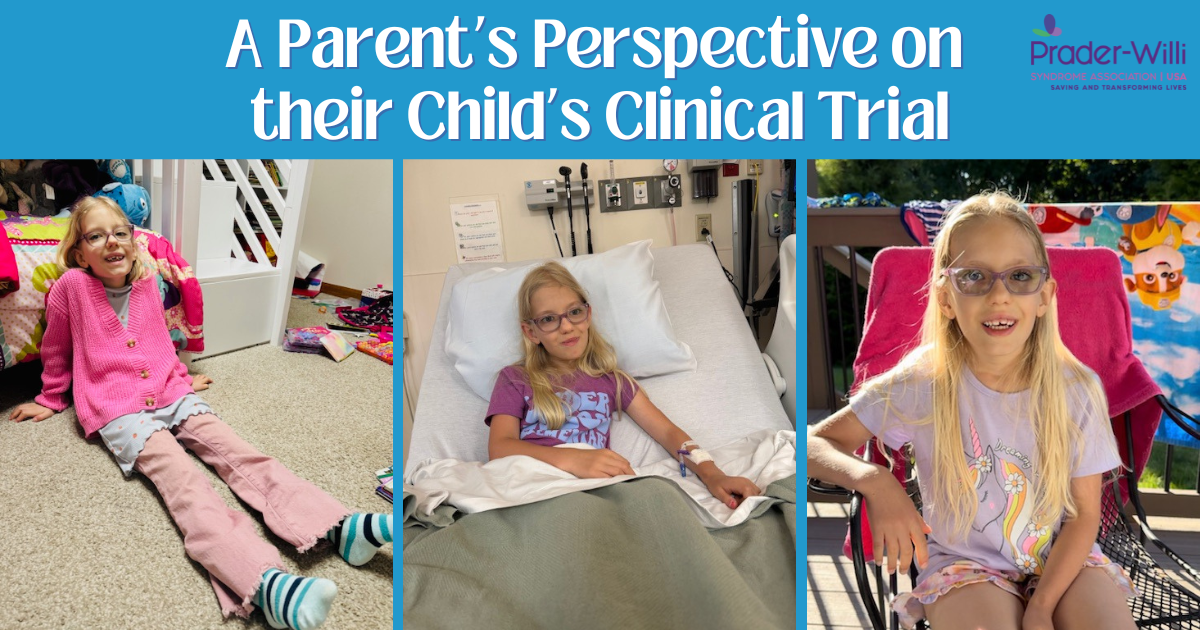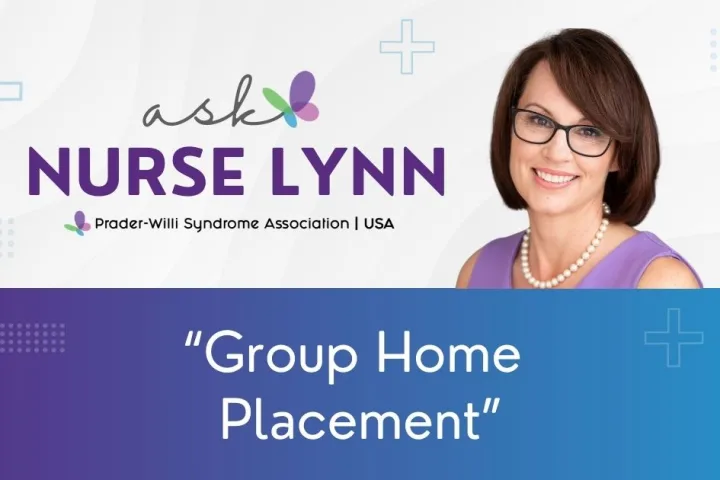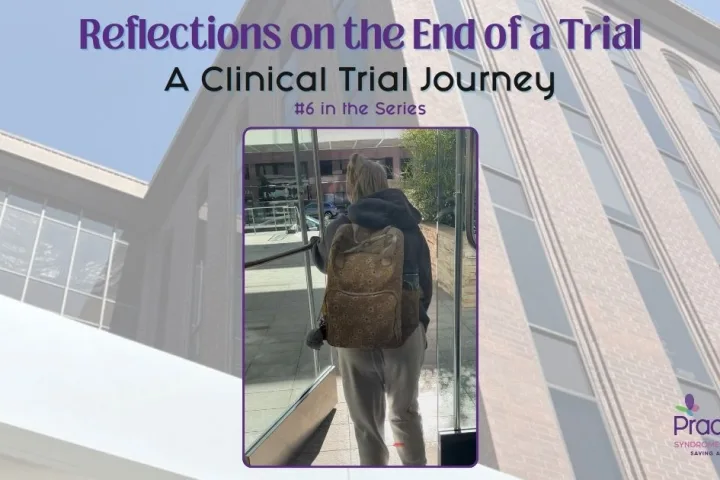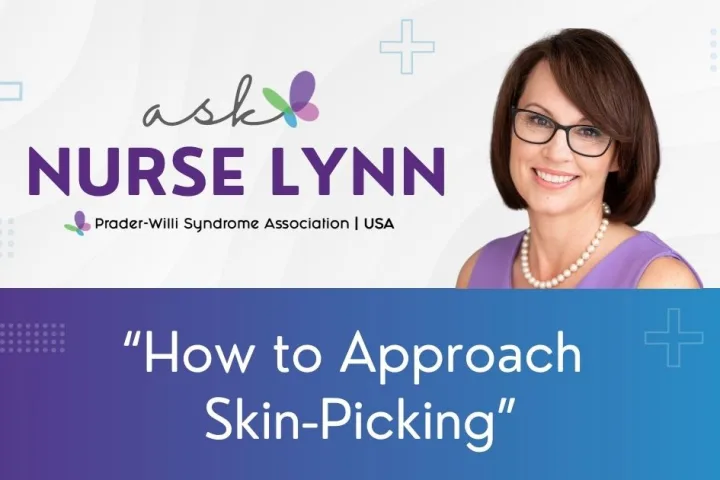contributed by Susan Fries, mom to Roselyn, 7-year-old living with PWS
“I feel like we are all waiting for that magic fix, and if it works for someone else then my kid must drink the kool-aid and it’ll work for them too. But we deep down know it doesn’t work that way as much as we all want it to. And it ultimately may take a cocktail to help. It’s so close we can touch it. We are driven by not only the hope that’s staring us in the face, but also the fear of that hope being ripped away in an instant, just like it has been over and over again the last few years. It’s terrifying living in a constant state of hyper-everything – awareness, hope, anxiety, fear, vigilance, protectiveness, research, fight or flight, etc.”
What is the age of your loved one and which trial are they enrolled in?
Roselyn is 7, and in the Carbetocin trial.
What inspired you to enroll your loved one in the trial?
Rose has battled anxiety and behavioral issues, along with increased food focus. Those paired together, and knowing each day she’s inching closer and closer to the tipping point of more hunger, we as her parents began looking into trials that might be beneficial to both the satiety and the anxiety. The Carbetocin trial focused on both, and was local, so we inquired if she might be a candidate. We also knew that this trial was proven to be safe previously, and it was an opportunity to provide valuable research to help others with PWS.
Was it an easy decision to enroll? Please explain your answer.
Though we thought in the beginning it would be an easy decision, it turned out we first decided against it. Roselyn was on the borderline of what we thought was being food-focused enough to participate, and if you do the screening and aren’t chosen, you are unable to do the screening again at a later date. So, initially, we held off. Then, all of a sudden, her food focus ticked up again, and we decided that it was worth a try, as if there’s a chance we can help our child, we want to do everything possible. So we called back the team and set up our initial screening.
Have you or will you consider enrolling in other trials?
Yes, if we are able to once this trial has ended, and if it might benefit Rose or other individuals with PWS, we would consider enrolling.
What has been the most challenging aspect of the trial?
The drug is a nasal spray, and the indication is not to use any other nasal sprays or medicines while taking it. This would include saline sprays/mists, Flonase, gels, etc. Rose suffers from seasonal allergies, so not being able to use Flonase was VERY difficult, as her regular liquid allergy medicine didn’t suffice, so she suffered a lot with itchy nose, eyes and throat, along with frustration and some refusal to take the Carbetocin/Placebo nasal spray. She was absolutely miserable with allergies.
Also, there was a glitch with the first appointment and not having the first dose of medicine on hand, so we had to reschedule that appointment, which meant lost time from work and school. Thankfully we are local, but that still did cause some issues with schedules.
What has been the most positive aspect of the trial?
We believe we have finally started to see a change in Roselyn since she’s started the open label portion of the trial. She is not rushing to the table when it is time for a meal, sometimes saying she isn’t hungry and would like to finish her task first. She isn’t asking for food at school or sneaking food at school. We are still diligent at home about keeping an eye on where she is, but she is not sneaking food off the counter or from her siblings nearly as much as she used to. There has been significant improvement. As far as her anxiety about food, it has decreased. Her other behaviors have remained consistent, so it is clear those are related to other triggers outside of food, which we will work on separately.
What advice would you offer parents who are trying to decide whether to enroll their loved one in a trial?
Participating in a trial is a very personal decision. What works for one family may not work for another – being it the drug, the travel, the administration of the medicine, etc. The drug may not work for your child, whereas it may work for another child. The research will help others with PWS, but that does NOT mean you have to participate. You also may do the screening with the hopes of being accepted, only to be told you do not qualify. It takes a big commitment, with time and schedules. We chose to wait until something local opened up, as we have other children, and we were unable to travel and find care for our other children.
Again, it’s a personal decision, with no right or wrong answer.
What role has your loved one played in the enrollment process?
Are they old enough to give consent? Do you think they fully understand what the trial is about? We explained up front what the trial was to Roselyn, at a high level, as she was old enough to know the basics of her special tummy, that the trial could help her, and could possibly someday help others and her friends with PWS. We explained there would be blood draws, some sticky pads to check her heart, nose sprays, and in the beginning we didn’t know if she would get the real med or the placebo saline med. She knows she has the real med now.
Once she turned 7 she was able to sign her own consent. She understands at a high level what the trial is about. And we’ll continue to help her understand that her medicine is helping her not have that hungry feeling all the time as well.
Share your clinical trial experience
If you have a loved one enrolled in a clinical trial and would like to share your experiences with the PWS community, please email africke@pwsausa.org
Share this!





 Perry A. Zirkel has written more than 1,500 publications on various aspects of school law, with an emphasis on legal issues in special education. He writes a regular column for NAESP’s Principal magazine and NASP’s Communiqué newsletter, and he did so previously for Phi Delta Kappan and Teaching Exceptional Children.
Perry A. Zirkel has written more than 1,500 publications on various aspects of school law, with an emphasis on legal issues in special education. He writes a regular column for NAESP’s Principal magazine and NASP’s Communiqué newsletter, and he did so previously for Phi Delta Kappan and Teaching Exceptional Children. Jennifer Bolander has been serving as a Special Education Specialist for PWSA (USA) since October of 2015. She is a graduate of John Carroll University and lives in Ohio with her husband Brad and daughters Kate (17), and Sophia (13) who was born with PWS.
Jennifer Bolander has been serving as a Special Education Specialist for PWSA (USA) since October of 2015. She is a graduate of John Carroll University and lives in Ohio with her husband Brad and daughters Kate (17), and Sophia (13) who was born with PWS. Dr. Amy McTighe is the PWS Program Manager and Inpatient Teacher at the Center for Prader-Willi Syndrome at the Children’s Institute of Pittsburgh. She graduated from Duquesne University receiving her Bachelor’s and Master’s degree in Education with a focus on elementary education, special education, and language arts.
Dr. Amy McTighe is the PWS Program Manager and Inpatient Teacher at the Center for Prader-Willi Syndrome at the Children’s Institute of Pittsburgh. She graduated from Duquesne University receiving her Bachelor’s and Master’s degree in Education with a focus on elementary education, special education, and language arts. Evan has worked with the Prader-Willi Syndrome Association (USA) since 2007 primarily as a Crisis Intervention and Family Support Counselor. Evans works with parents and schools to foster strong collaborative relationships and appropriate educational environments for students with PWS.
Evan has worked with the Prader-Willi Syndrome Association (USA) since 2007 primarily as a Crisis Intervention and Family Support Counselor. Evans works with parents and schools to foster strong collaborative relationships and appropriate educational environments for students with PWS. Staci Zimmerman works for Prader-Willi Syndrome Association of Colorado as an Individualized Education Program (IEP) consultant. Staci collaborates with the PWS multi-disciplinary clinic at the Children’s Hospital in Denver supporting families and school districts around the United States with their child’s Individual Educational Plan.
Staci Zimmerman works for Prader-Willi Syndrome Association of Colorado as an Individualized Education Program (IEP) consultant. Staci collaborates with the PWS multi-disciplinary clinic at the Children’s Hospital in Denver supporting families and school districts around the United States with their child’s Individual Educational Plan. Founded in 2001, SDLC is a non-profit legal services organization dedicated to protecting and advancing the legal rights of people with disabilities throughout the South. It partners with the Southern Poverty Law Center, Protection and Advocacy (P&A) programs, Legal Services Corporations (LSC) and disability organizations on major, systemic disability rights issues involving the Individuals with Disabilities Education Act (IDEA), Americans with Disabilities Act (ADA), and the federal Medicaid Act. Recently in November 2014, Jim retired.
Founded in 2001, SDLC is a non-profit legal services organization dedicated to protecting and advancing the legal rights of people with disabilities throughout the South. It partners with the Southern Poverty Law Center, Protection and Advocacy (P&A) programs, Legal Services Corporations (LSC) and disability organizations on major, systemic disability rights issues involving the Individuals with Disabilities Education Act (IDEA), Americans with Disabilities Act (ADA), and the federal Medicaid Act. Recently in November 2014, Jim retired.